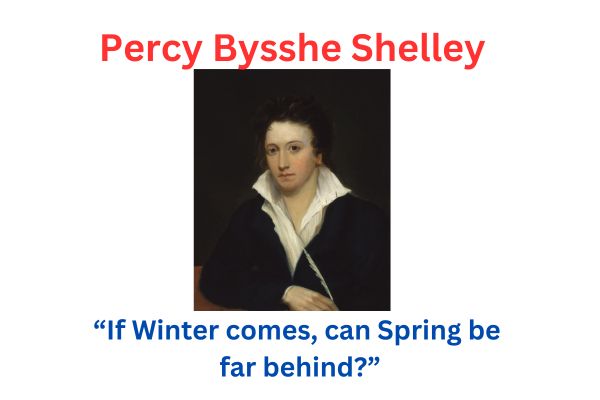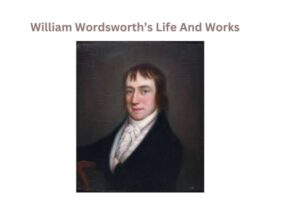Important British Writer P.B.Shelley
Introduction:
Picture this: a misty morning in the English countryside, the air filled with the promise of a new day. In this serene setting, a child is born into a world of privilege and possibility. That child was Percy Bysshe Shelley, whose name would one day echo through the annals of literary history. Born on August 4, 1792, in Sussex, Shelley’s early years were marked by a sense of wonder and exploration. His upbringing in a wealthy family provided him with access to the finest education and cultural experiences, but it was his insatiable curiosity and rebellious spirit that set him apart.
From a young age, P.B.Shelley was drawn to the world of ideas, eagerly devouring books and engaging in spirited debates with his peers. His schooling at Eton College and later Oxford University only served to fuel his intellectual fire, but it was his expulsion from Oxford for publishing “The Necessity of Atheism” that truly set him on the path to literary greatness. It was a bold move for a young man barely out of his teens, but it was indicative of the fearlessness and conviction that would come to define Shelley’s life and work.
Early Life and Education:
P.B.Shelley’s upbringing was anything but ordinary. Born into a wealthy family, he was exposed to ideas and experiences that fueled his intellectual curiosity from a young age. Schooling at Eton College and later Oxford University shaped him, but it was his independent spirit and radical beliefs that truly defined him. Imagine the shockwaves when he published “The Necessity of Atheism” and got expelled from Oxford! That’s the kind of rebel Shelley was, unafraid to challenge convention and speak his truth.
Literary Career and Major Works:
P.B.Shelley’s literary career began in earnest in the midst of the Romantic movement, a turbulent period in English history marked by social upheaval and revolutionary fervor. His early works, such as “Queen Mab” and “Alastor,” revealed a young poet grappling with big ideas and philosophical questions. But it was with the publication of “Hymn to Intellectual Beauty” and “Mont Blanc” that Shelley truly began to make his mark on the literary world.
In these poems, P.B.Shelley’s lyrical voice soared, capturing the essence of the sublime and the transcendent. Through vivid imagery and stirring language, he explored themes of beauty, nature, and the human spirit, laying the groundwork for the revolutionary poetry that would follow.
One of P.B.Shelley’s most ambitious works is “Prometheus Unbound,” a lyrical drama inspired by Greek mythology and imbued with the spirit of Romantic rebellion. Through the character of Prometheus, Shelley sought to challenge the oppressive forces of authority and champion the power of the human will. It was a bold and audacious work, filled with soaring poetry and visionary imagery, and it solidified Shelley’s reputation as one of the preeminent poets of his generation.
Another of P.B.Shelley’s masterpieces is “Adonais,” a haunting elegy written in memory of his friend and fellow poet John Keats. In this deeply personal work, Shelley grapples with themes of loss and mortality, weaving together images of grief and transcendence to create a hauntingly beautiful tribute to his fallen comrade. It’s a testament to Shelley’s poetic genius and his ability to find beauty even in the darkest of times.
As we delve deeper into the life and work of P.B.Shelley, we are reminded of the power of poetry to transcend the boundaries of time and space, to speak to the deepest truths of the human experience. In P.B.Shelley’s words, we find solace, inspiration, and a profound sense of connection to something greater than ourselves. And as we continue to grapple with the complexities of the world around us, we can take comfort in the knowledge that Shelley’s poetry will always be there to guide us, to inspire us, and to remind us of the enduring power of the human spirit.
Social and Political Vision:
Shelley wasn’t content to just write poetry; he wanted to change the world. His passionate advocacy for individual liberty and social equality shines through in works like “The Masque of Anarchy,” a stirring call to arms against oppression and injustice. P.B.Shelley wasn’t afraid to speak truth to power, and his words continue to inspire those who dare to challenge the status quo.
Legacy and Influence:
Shelley’s impact on English literature cannot be overstated. His poetry has inspired countless writers and thinkers, from the Romantics of his time to the modernists and beyond. But perhaps his greatest legacy lies in his belief in the power of art to transform society. Through his poetry, Shelley reminds us that we all have the power to change the world, one word at a time.
Conclusion:
In the end, Percy Bysshe Shelley was more than just a poet; he was a visionary whose words continue to resonate with readers across the ages. His life may have been short, but his legacy lives on in the hearts and minds of those who dare to dream of a better world. As we journey through his works, we are reminded of the transformative power of poetry and the enduring spirit of rebellion that burns bright in us all.
Read Also : Exploring the Life and Works of William Wordsworth: A Guide for UGC NET English

